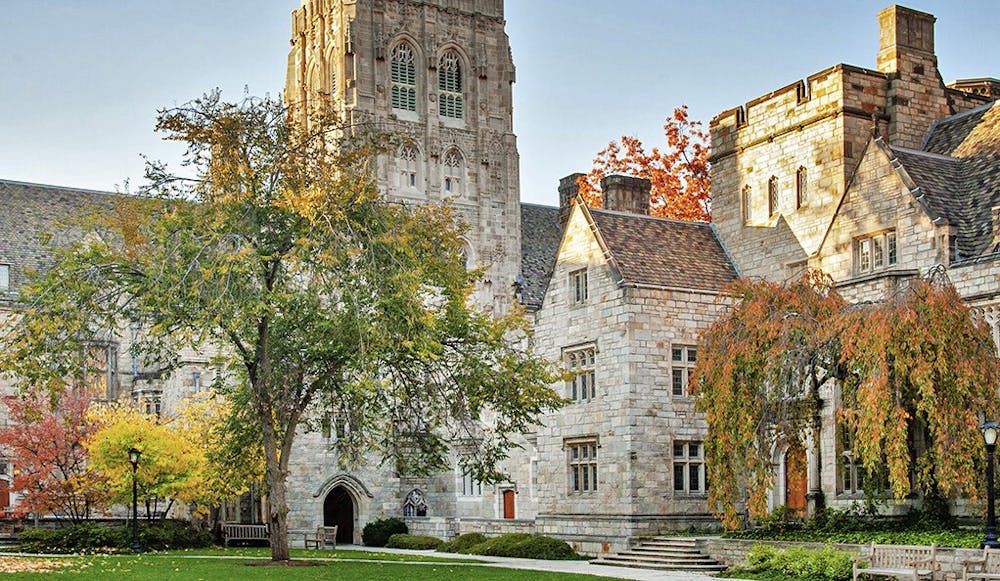Duke’s QuadEx initiative follows in the footsteps of residential college models at many of its peer institutions.
Under QuadEx, students will be assigned to one of seven residential Quads before they arrive on campus and maintain affiliation with their Quad for all four years.
First-year students will still live on East Campus, where each residence hall is linked to a West Campus Quad. Sophomores and juniors may choose roommates and request to block with other students, but they will all be from the same Quad affiliation.
The University will also no longer provide dedicated section housing for Greek and non-Greek selective living groups after the 2022-23 school year.
This fall, Stanford University piloted ResX, a residential neighborhood model where existing Stanford residences were divided into eight neighborhoods. Each neighborhood hosts first-year and multi-year residences, as well as specialty housing, which includes Greek houses and apartment-style residences. Incoming first-years are assigned to a neighborhood, which most will stay in through their four years.
Duke’s QuadEx plan also includes creating Quad courses, titled Duke-Durham 101, which will introduce first-years to Duke and Durham and prepare them “for good citizenship in both.”
As part of ResX, Stanford launched a first-year core called Civil, Liberal and Global Education (COLLEGE), which will “give all first years a shared intellectual experience and the opportunity to engage deeply with civic responsibility and global perspectives.”
Most similar to Duke’s QuadEx are residential college systems at Yale University, Rice University and Dartmouth College.
At Yale, first-years are assigned to one of the 14 colleges before they arrive on campus. First-year students live together on Old Campus, but are affiliated with the college that they will live in sophomore year.
Likewise at Dartmouth, incoming students are assigned membership to one of six House Communities. Freshmen live in a first-year dorm affiliated with a House and then move into the House’s residency halls as a sophomore. Dartmouth also provides houses for Greek and selective living groups.
Rice also places each undergraduate as a member of one of the 11 residential colleges before they matriculate. There is no designated first-year campus, although incoming students are allowed to request a roommate or to be assigned to the same college as an incoming student. Rice has no Greek organizations.
At Princeton University, incoming students are randomly assigned to one of the six residential colleges, where they must live for their first two years.
Students at Harvard University spend their first year in dormitories in Harvard Yard. While Duke will assign students a residential college before they arrive on campus, Harvard randomly assigns them at the end of their first year to one of the 12 Houses, where they remain for the next three years. First-years are provided the option to enter the lottery as a block with up to eight people.
Unlike Duke’s model, residential colleges at Harvard, Yale, Rice and Princeton each have their own designated facilities, such as dining halls, libraries and gyms.
Other colleges feature residential college systems that students may voluntarily join.
The University of Pennsylvania has 13 College Houses, including five first-year communities, four upperclass communities and four four-year communities. Over 40 specialized communities live in “theme floors” in tight-knit communities within the Houses. Most of the fraternity and sorority houses at UPenn are also University owned and operated.
Northwestern University’s residence colleges each have a unifying theme and are headed by faculty members. Students may also choose to live in traditional residence halls. Greek organizations and special interest housing groups are provided housing in either small houses or sections in residence halls.
Although the California Institute of Technology has no Greek organizations on campus, their residential college system has a similar process to rush. First-years can participate in “rotation,” where they get to know the eight residential communities and then rank them according to preference for house affiliation. Students who wish to join a house after their first year must go through the house’s membership process.
Get The Chronicle straight to your inbox
Sign up for our weekly newsletter. Cancel at any time.

Milla Surjadi is a Trinity junior and a diversity, equity and inclusion coordinator of The Chronicle's 119th volume. She was previously editor-in-chief for Volume 118.

